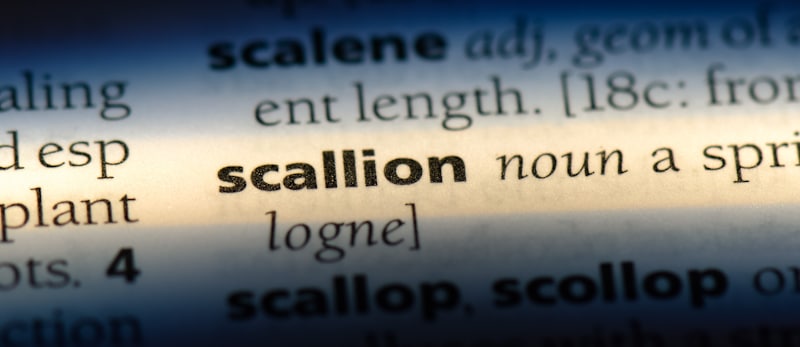When we are talking about plants, their common name is always easy to know and remember; however, when it regards their botanical or scientific name, it might need to be clarified to know which plant one is referring to. The words “scallion” and “scallion” refer to a species of plants; we will learn more about them as we move on.
Escallion and scallion are two different types of nouns; an escallion is a welsh onion, and a scallion is referred to as a spring onion. The fundamental distinction between escarole and scallop is that the scallop is a plant species, whereas the scallop is one of several Allium species.
The words “scallion” and “escallion” are commonly confused with one another; this is a mistake a writer should never make. This article will help clarify how to correctly use these words in a sentence.

What Does The Word “Scallion” Mean?
The word “scallion” can be defined as a spring onion; it refers to any of the many closely related Allium species. This word refers to a little onion called Allium ascalonicum, which is indigenous to Palestine. It is an onion without a fully formed bulb.
Scallions are a variety of Allium onion species, sometimes called green onions or salad onions. Garlic, shallot, leek, chive, spring onions, and Chinese onions are among their near relatives. The taste of scallions is milder than that of most onions.
Although many Allium species have edible bulbs, scallion species are distinguished by the absence of a completely grown bulb. Scallion-like Allium species have hollow, tubular green leaves that emerge from the bulb. These leaves are consumed either fresh or cooked as a vegetable.
Similar to how onions or garlic are diced, the leaves are frequently added to various cuisines. Scallion and shallot are related words that have roots in the Ancient Greek word “askolónion,” according to the Greek author Theophrastus. The name of the historic Canaanite city of Ashkelon is thought to be the source of this name.
In addition to the names listed above, scallions are also known as spring onions, salad onions, green onions, onion sticks, long onions, table onions, baby onions, gibbons, syboes, and shallots.
Scallions can be cooked whole or sliced, although they are best eaten raw in salads, as crudites, or as a last-minute sauce garnish. Frequently utilized as a garnish in many different recipes, scallions are common in Latin American and Asian cuisine.
What Does The Word “Escallion” Mean?
The escallion is a culinary herb grown in Trinidad and Tobago and Jamaica. The word “escallion” can be defined as a perennial plant species that is frequently mistaken for a type of scallion. It is also referred to as a welsh onion, long green onion, or spring onion.
The Jamaican word is most likely a variation of the American phrase “scallion,” a general term for spring onions, leeks, shallots, and the greenish stalk of young garden onions. It is a mild onion that cannot grow into a sizable bulb, similar to these others. Although it resembles leeks and spring onions in appearance, Jamaicans claim it has a stronger flavor.
Escallion is an older spelling that dates back to the fourteenth century; escallion first appears in writing in the seventeenth century. Outside of its Jamaican meaning, the word “escallion” is no longer in everyday use in English.
Commercially available escallion-based spice blends from Jamaica. Escarole is used with thyme, garlic, Scotch bonnet pepper, and allspice in Jamaican cooking. In place of escallion in salads, the leek is occasionally recommended in recipes. Outside of Jamaica, fresh escallion is uncommon and pricey.
The common name “Welsh onion” did not refer to Wales; instead, it comes from an almost extinct usage of the word “Welsh” to mean “foreign, non-native.” However, the species is native to China, has been widely cultivated, and has naturalized in a few isolated areas throughout Eurasia and North America.
There are hybrids between this species and the related common onion, Allium cepa, because of their shared flavor and odor. However, A. fistulosum does not produce bulbs and has hollow foliage and scapes.
Smaller forms of A. fistulosum resemble chives, whereas more significant types like the Japanese Negi resemble the leek. A. fistulosum can grow by clumping together as perennial evergreens; additionally, it is planted in groups as an attractive plant. In place of escallion in salads, the leek is occasionally recommended in recipes.
How To Properly Use The Words “Scallion” And “Escallion” In A Sentence
We use the word “scallion” when referring to a spring onion or Allium fistulosum. It refers to any of the closely related Allium species; it describes any onion without a fully formed bulb.
This word is used in a sentence when talking about an eschalot, or shallot, which is a little onion indigenous to Palestine. Any onion that retains a sturdy stem like a leek and does not “bottom out” is called a “scallion.”
This word describes a cooking plant thought to have originated from the wild Allium ampeloprasum immature onion well before the bulb grew huge, with flat, interlocking dark green leaves.
We use the word “escallion” to refer to a culinary herb or plant grown in Trinidad and Tobago and Jamaica, although it resembles leeks and spring onions in appearance. It is used when describing a bland onion that cannot develop into a sizable bulb.
Commercially available escallion-based spice blends from Jamaica. In Jamaican cooking, escallion is a common component. In place of escallion in salads, the leek is occasionally recommended in recipes. Outside of Jamaica, fresh escallion is uncommon and pricey.

Examples Of The Words “Scallion” And “Escallion” Used In Sentences
Below are some illustrative examples of the word “scallion” in a sentence.
- I told Esther to try the house specialty dish called “campfire fettuccine,” which includes andouille sausage, BBQ shrimp, mushrooms, grilled chicken, scallions, and spinach in a red chili cheese sauce.
- She provided individual plates of salt for dipping and radishes and scallions for breakfast throughout the holiday season.
- A Jonkanoo spicy seasoning is also available; it is characterized as “a carnival of red hot peppers combined with scallions, thyme, onions, and garlic.”
- The name “scallions” is also used for old onions with leaves and stems, but no bulbs are often used to describe these bulbless onions.
- Squid with shredded pepper, pork with scallion, shredded beef with soy bean sauce, and shrimps with pickled hot pepper are a few of the superb main course items available on the menu at the restaurant.
Below are examples of the word “escallion” in a sentence.
- We prepared a noodle meal cooked with seasonal ramen, udon noodles, leeks, or escallion in a boiling dashi soup.
- The escallion is used chiefly as a scallion or salad onion in the West, but it is also used frequently elsewhere, especially in East Asia.
- Escallion is a misnomer since the species is native to China, despite being widely farmed and having naturalized in a few isolated regions of Eurasia and North America.
- Escallions have also been referred to as “Nanba” in Osaka since the Edo era, despite there being no recognition related to the famous Welsh onion grower.
- In addition to extensive rice farming, the town is a significant producer of tomatoes, kabocha, a Japanese form of winter squash, and ” Negi, “an escallion.
Final Thoughts
Escallion and scallion are different words because escallion is a type of Welsh onion, while scallion is a type of spring onion. Due to the similar pronunciation of these words, it is easy to confuse them with one another. As a writer, you should be careful to avoid making such mistakes. With this article, you should know how to use these words in a sentence.
Shawn Manaher is the founder and CEO of The Content Authority. He’s one part content manager, one part writing ninja organizer, and two parts leader of top content creators. You don’t even want to know what he calls pancakes.

